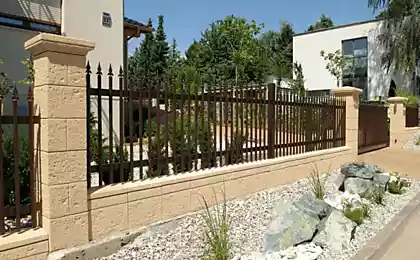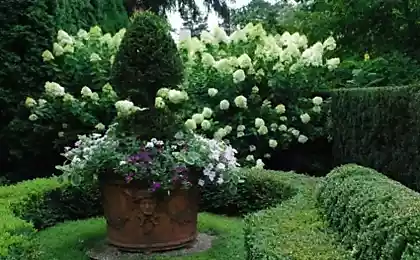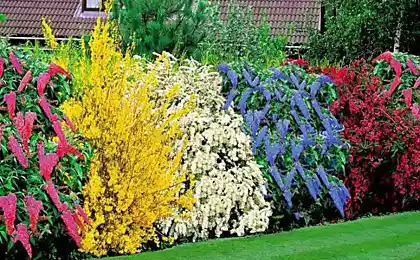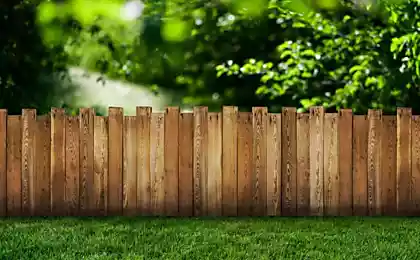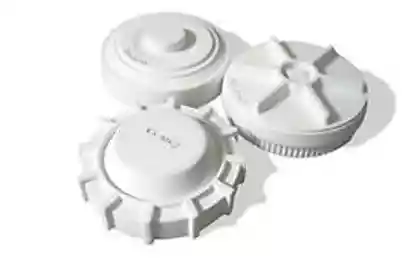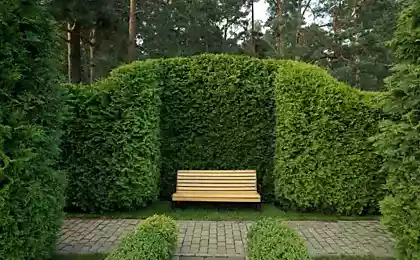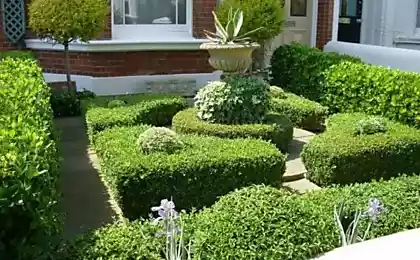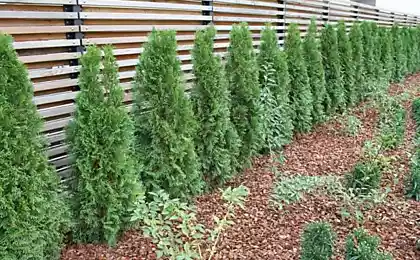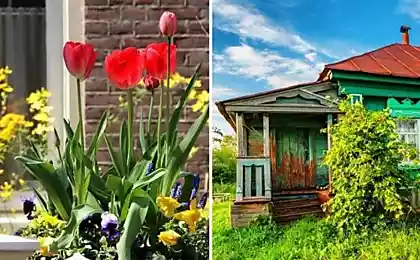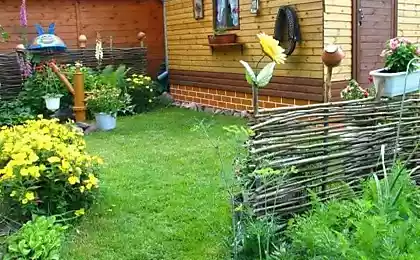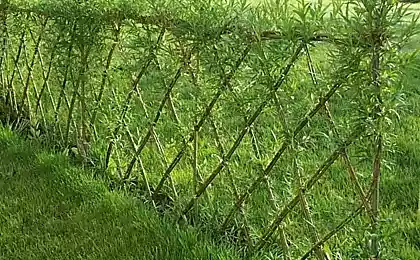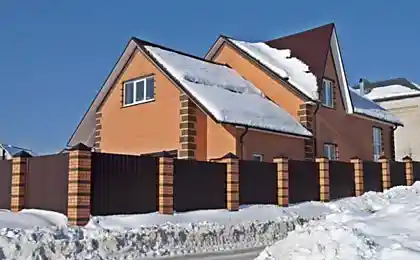281
I grew a hedge instead of a fence, I warn you which plants can capture the whole country.
Spring is coming, spring is coming! The approach of the long-awaited warmth makes avid summer residents fuss and evaluate the front of work for the near future. Here, for example, hedge A great idea, it's a pity, it's not cheap. And even professionals would find, not a sharashkin office.
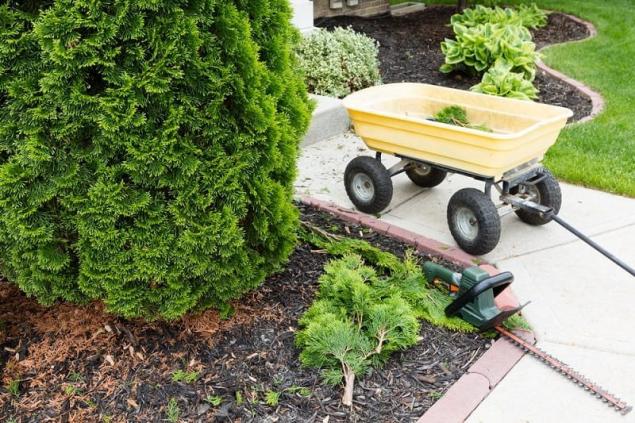
But our editorial office. "Site" It might help here. Today we will tell you some of the most relevant ideas regarding living fence, share tips and generally prepare you for how to turn an ordinary suburban fence into something beautiful. Join me, it'll be interesting!
So, let’s start with what are the options of the fence and how they differ.
Low hedge (border) Obviously, for such a fence, you will need short plant species, such as: boxwood, lingonberry, cypresso, golden currants. Such a fence can be combined with flowering plants higher. It will look great against their background. And, by the way, it is perfectly possible to frame various elements of your garden: flowerbed, decorative elements, even a well.
Zoning fence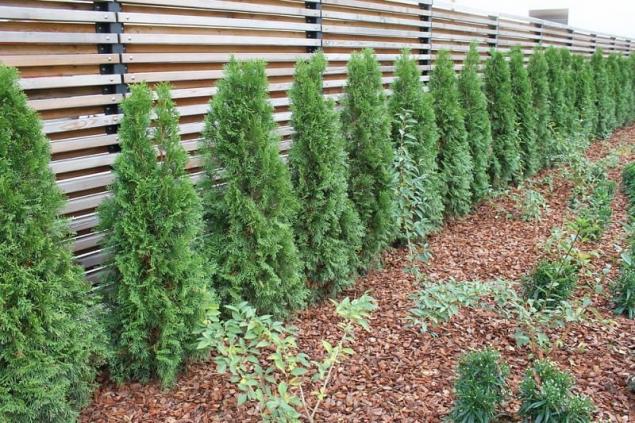
If your site needs to be divided into a work area, a recreation area or any other, plants about a meter high will be useful. Shadows they give little, look beautiful and visually divide the area into the right segments. Plants will do well: Gooseberry, Thunberg barberry, short-sized species of cherry buds and even decorative cherries. It looks very beautiful, and practical, in fact.
A wall of flowers is like a hedge Behind such a hedge, you can hide a low fence. It looks beautiful and yet the fence remains in its place. At the same time, you relax from the bustle of the city, breathing in the delicate aroma of flowers. Hawthorn, Spirea, red currants. They'd be great for this. They grow rapidly, and the flowering time on average takes from one month. If you wish, a flowering fence can be combined with a green curb.
View this post on Instagram
A post shared by Live Green Screens (@plyush_it)
If you and your neighbors are doing well and the fence serves more as a reminder of your property, rather than a real means of preserving property, you can make a very interesting move. Namely, to decorate it with curly plants. If desired, you can combine elements of the original design with the plants themselves. If you like flowers, choose. clematis, woven rose or wisteria. Leafy wines are tree-plate.
View this post on Instagram
A post shared by Tui in New Riga (@thujas.ru)
A height of 2 or even 3 meters almost guarantees you complete privacy. Even the most curious neighbor, we guarantee, won't be able to reach you. Unless, of course, she plays professional basketball. Plants you also need appropriate: thorn, hazel, silvery loch, Hungarian lilac or white derena. These trees will save you from the heat and excess eyes.
Combining different plants to your taste, you can achieve excellent results and a completely fabulous color scheme.
Caring for a hedge is much more difficult than regular garden trees. Most of the plants that it consists of are fast growing. And adjusting their shape and size is required constantly. It is impossible to come once in a couple of weeks and admire the beauty. So this option is best suited for avid summer residents who do not go to the city at all. Okay, we're kidding, it's not that scary, but we're gonna have to work.
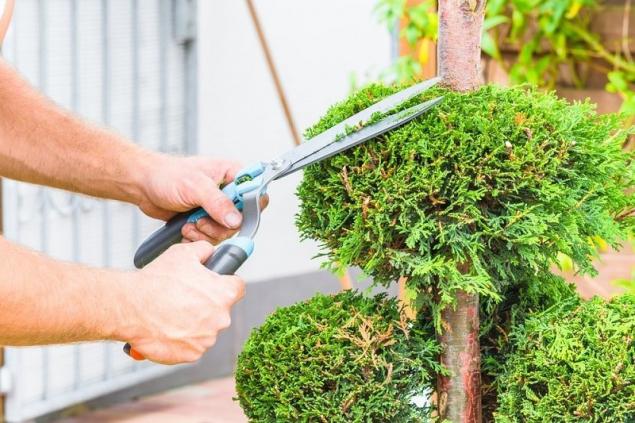
Deciduous varieties of plants when planted in the ground are severely pruned. Only about 15 cm above ground remains. Thus, the growth of shoots at their base is accelerated. A year later, the hedge is trimmed 4 more times. This is necessary for a thicker growth of branches. In subsequent years, haircuts are needed, in fact, to give plants the desired shape. It does not affect the acceleration of growth or quality.
In the season, the hedge is regularly watered. To do this, the land around it should be carefully loosened (60 cm in both directions), and the stream of water should be directed to the base of plant growth. Soil moisture should be provided by at least 30 cm.
View this post on Instagram
A post shared by Tamara Smolina (@smolinatamara2311)
In addition to watering, the fence also needs soil fertilization. Organic. It is added to the soil in autumn and spring. Peat, ash, compost, humus. From 2 to 5 kg of fertilizer per 1 square meter is used. Mineral Fertilizers consist of potassium salt, ammonium sulfate and superphosphate. They are mixed in different proportions, depending on the type of fence and type of plants.
View this post on Instagram
A post shared by Landshaft_almaty (@landshaft_almaty)
The hedge is suitable both for decorating the site and for real protection from the sun and other people's views. Yes, you need to know how to care for her and when to water her. It is necessary to cut the fence often, giving it the desired shape. But the result will surprise your family and guests, so it's really worth it.

But our editorial office. "Site" It might help here. Today we will tell you some of the most relevant ideas regarding living fence, share tips and generally prepare you for how to turn an ordinary suburban fence into something beautiful. Join me, it'll be interesting!
So, let’s start with what are the options of the fence and how they differ.
Low hedge (border) Obviously, for such a fence, you will need short plant species, such as: boxwood, lingonberry, cypresso, golden currants. Such a fence can be combined with flowering plants higher. It will look great against their background. And, by the way, it is perfectly possible to frame various elements of your garden: flowerbed, decorative elements, even a well.
Zoning fence

If your site needs to be divided into a work area, a recreation area or any other, plants about a meter high will be useful. Shadows they give little, look beautiful and visually divide the area into the right segments. Plants will do well: Gooseberry, Thunberg barberry, short-sized species of cherry buds and even decorative cherries. It looks very beautiful, and practical, in fact.
A wall of flowers is like a hedge Behind such a hedge, you can hide a low fence. It looks beautiful and yet the fence remains in its place. At the same time, you relax from the bustle of the city, breathing in the delicate aroma of flowers. Hawthorn, Spirea, red currants. They'd be great for this. They grow rapidly, and the flowering time on average takes from one month. If you wish, a flowering fence can be combined with a green curb.
View this post on Instagram
A post shared by Live Green Screens (@plyush_it)
If you and your neighbors are doing well and the fence serves more as a reminder of your property, rather than a real means of preserving property, you can make a very interesting move. Namely, to decorate it with curly plants. If desired, you can combine elements of the original design with the plants themselves. If you like flowers, choose. clematis, woven rose or wisteria. Leafy wines are tree-plate.
View this post on Instagram
A post shared by Tui in New Riga (@thujas.ru)
A height of 2 or even 3 meters almost guarantees you complete privacy. Even the most curious neighbor, we guarantee, won't be able to reach you. Unless, of course, she plays professional basketball. Plants you also need appropriate: thorn, hazel, silvery loch, Hungarian lilac or white derena. These trees will save you from the heat and excess eyes.
Combining different plants to your taste, you can achieve excellent results and a completely fabulous color scheme.
Caring for a hedge is much more difficult than regular garden trees. Most of the plants that it consists of are fast growing. And adjusting their shape and size is required constantly. It is impossible to come once in a couple of weeks and admire the beauty. So this option is best suited for avid summer residents who do not go to the city at all. Okay, we're kidding, it's not that scary, but we're gonna have to work.

Deciduous varieties of plants when planted in the ground are severely pruned. Only about 15 cm above ground remains. Thus, the growth of shoots at their base is accelerated. A year later, the hedge is trimmed 4 more times. This is necessary for a thicker growth of branches. In subsequent years, haircuts are needed, in fact, to give plants the desired shape. It does not affect the acceleration of growth or quality.
In the season, the hedge is regularly watered. To do this, the land around it should be carefully loosened (60 cm in both directions), and the stream of water should be directed to the base of plant growth. Soil moisture should be provided by at least 30 cm.
View this post on Instagram
A post shared by Tamara Smolina (@smolinatamara2311)
In addition to watering, the fence also needs soil fertilization. Organic. It is added to the soil in autumn and spring. Peat, ash, compost, humus. From 2 to 5 kg of fertilizer per 1 square meter is used. Mineral Fertilizers consist of potassium salt, ammonium sulfate and superphosphate. They are mixed in different proportions, depending on the type of fence and type of plants.
View this post on Instagram
A post shared by Landshaft_almaty (@landshaft_almaty)
The hedge is suitable both for decorating the site and for real protection from the sun and other people's views. Yes, you need to know how to care for her and when to water her. It is necessary to cut the fence often, giving it the desired shape. But the result will surprise your family and guests, so it's really worth it.
Wise mother borrows money from children after salary, and at the end of the month returns them
Removing the cuticle without scissors, ten minutes a week for perfect hands is enough
